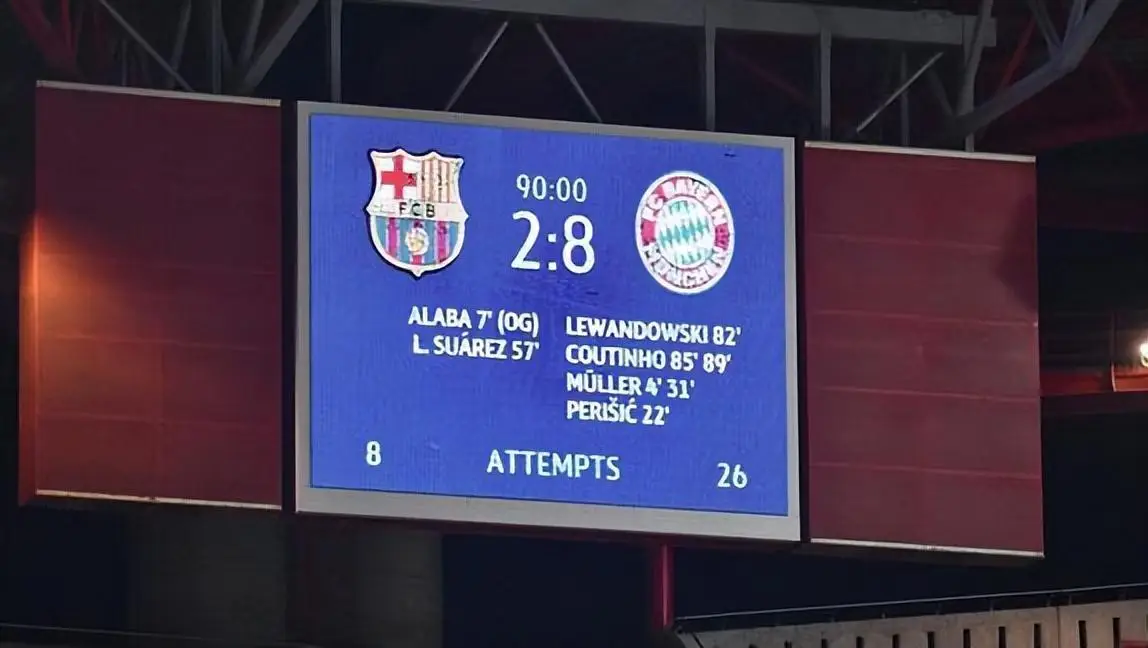
The Stage: A Pandemic, a Format, and a Fading Giant
By August 2020, the world was grappling with the COVID-19 pandemic, and football had been upended. The UEFA Champions League, paused since March, resumed with a radical twist: knockout stages would be single-leg ties in Lisbon, Portugal, replacing the traditional home-and-away format. For FC Barcelona, this setup amplified risk—their aging squad, reliant on familiarity and home comforts, faced a high-stakes gamble against Bayern Munich, a team in ruthless form.
Barcelona entered the quarterfinal as six-time European champions, but cracks were evident. Manager Quique Setién, appointed in January 2020 after Ernesto Valverde’s sacking, had failed to stabilize a side adrift in La Liga and struggling to recapture the tiki-taka brilliance of the Pep Guardiola era. The squad, featuring 32-year-old Lionel Messi, 33-year-old Sergio Busquets, and 34-year-old Gerard Piqué, lacked pace and pressing intensity—flaws that would prove fatal against Bayern’s relentless machine .
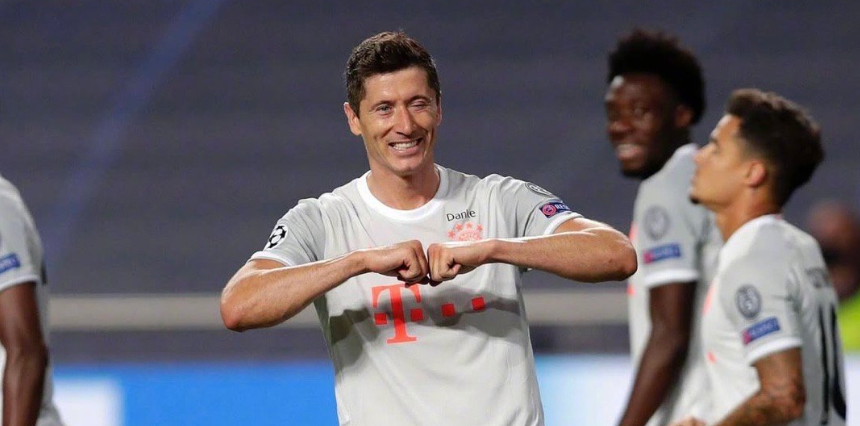
The Match: A Masterclass in Humiliation
What unfolded at Lisbon’s Estádio da Luz on August 15, 2020, was not just a defeat but a dismantling. Bayern, coached by Hansi Flick, executed a tactical masterclass, exposing Barcelona’s frailties with clinical precision.
The Onslaught: Bayern scored five goals in the first half alone. Thomas Müller opened the scoring in the 7th minute, capitalizing on a Busquets turnover. Serge Gnabry added two quickfire goals (21st, 31st), while Robert Lewandowski and Joshua Kimmich piled on the misery. Barcelona’s defense, slow to track runs and disjointed in pressing, looked helpless. Messi, isolated upfront, touched the ball just 26 times in the first 45 minutes—his lowest in a Champions League knockout match in a decade .
A Brief Respite, Then Ruin: Barcelona pulled one back through Ousmane Dembélé early in the second half, but Bayern responded with three more goals: Müller’s second, a Leon Goretzka strike, and an 82nd-minute goal from Philippe Coutinho—ironically, a former Barcelona player. Antoine Griezmann’s late consolation made the scoreline 8-2, but it mattered little.
The statistics laid bare the disparity: Bayern dominated possession (55%), registered 26 shots (14 on target) to Barcelona’s 9, and completed 14 successful dribbles to Barcelona’s 3. More telling was the expected goals (xG) gap: Bayern’s xG stood at 5.6, Barcelona’s at 1.2—reflecting a chasm in quality and intent .
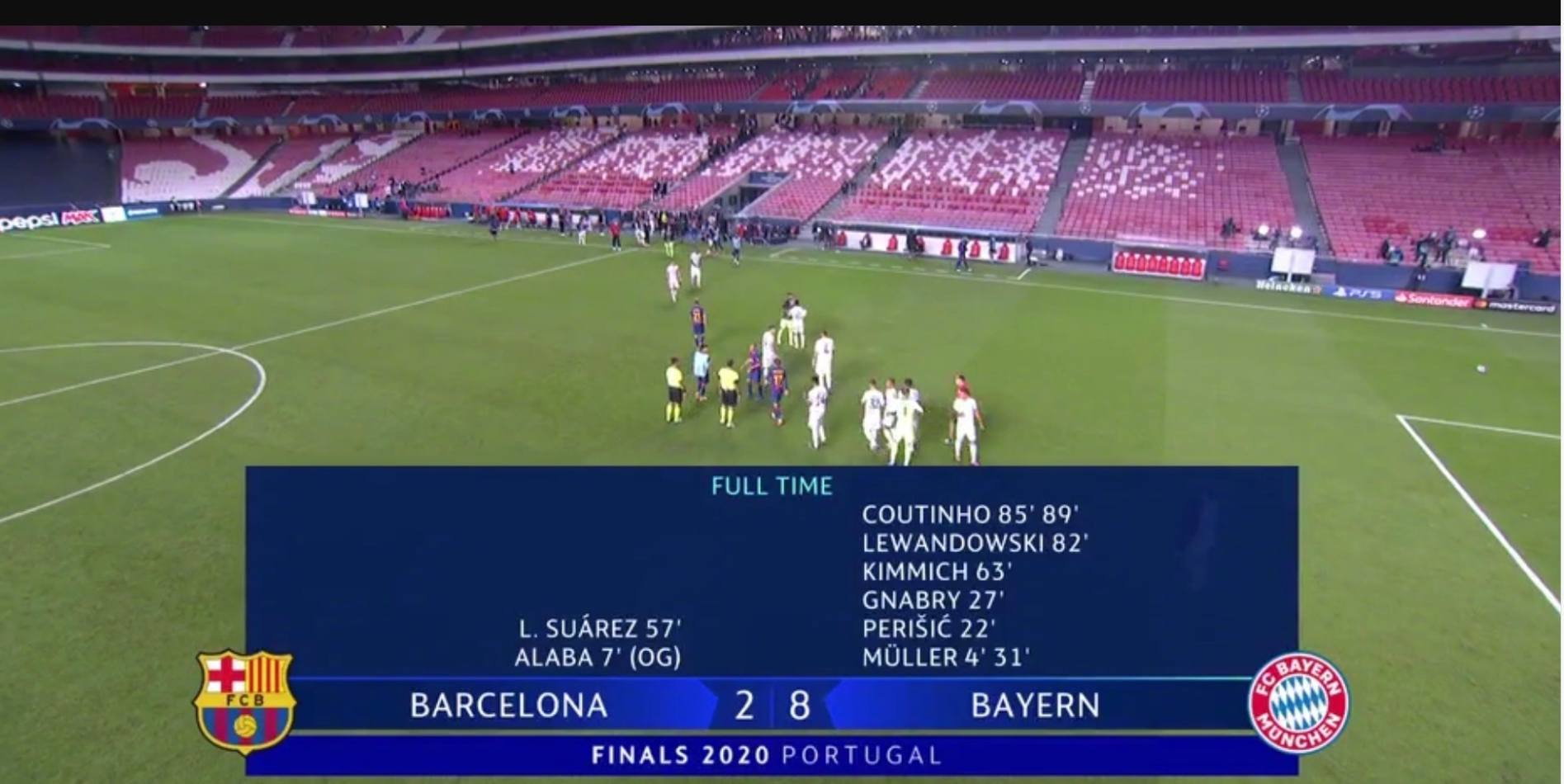
The Root Causes: Decay Beneath the Surface
The 8-2 defeat was not an anomaly but the culmination of years of systemic failure at Barcelona:
Tactical Stagnation: Setién’s rigid 4-3-3 formation failed to adapt to Bayern’s high press. Busquets, once the heartbeat of Barcelona’s midfield, was overwhelmed by Bayern’s pressing trio of Kimmich, Goretzka, and Müller. The full-backs, Jordi Alba and Nelson Semedo, were caught out repeatedly, leaving Piqué and Clément Lenglet exposed to Bayern’s rapid transitions.
Squad Mismanagement: Barcelona’s transfer policy had prioritized star names over balance. Coutinho (£142 million) and Griezmann (£108 million) arrived with huge price tags but struggled to integrate into Messi’s orbit. Young talents like Riqui Puig were marginalized, while the club failed to replace legends like Xavi and Andrés Iniesta, creating a midfield void.
Messi’s Isolation: The Argentine, 33 at the time, carried the team’s creative burden alone. With no reliable playmaker alongside him, he dropped deep to receive the ball, leaving Barcelona toothless in attack. Bayern’s defenders, unconcerned by Barcelona’s supporting cast, focused solely on neutralizing Messi.
Cultural Entitlement: For years, Barcelona had relied on their “DNA”—possession football and individual brilliance—without evolving. Bayern, by contrast, blended pressing intensity with direct, vertical football, embodying modern tactical trends that Barcelona had neglected.
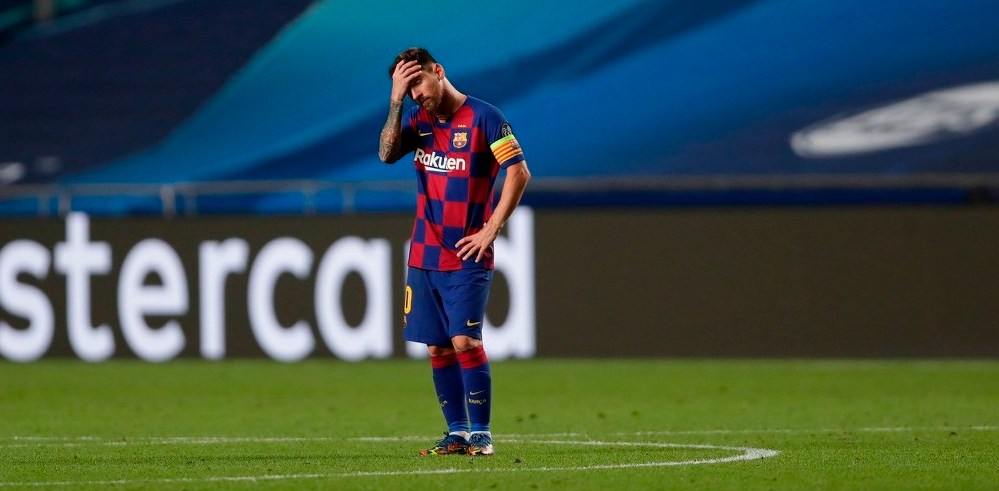
The Aftermath: A Reckoning and a Reset
The defeat sent shockwaves through Catalonia. Within 48 hours, Setién was sacked. President Josep Maria Bartomeu, already unpopular due to mismanagement and a failed “super league” plot, faced mass protests. The club’s “Espai Barça” project—a £1.2 billion stadium renovation—was questioned, with fans demanding investment in the squad instead.
The Ronald Koeman Era: Former Barcelona player Ronald Koeman was appointed manager, tasked with rebuilding. He began by offloading veterans (Luis Suárez, Arturo Vidal) and promoting La Masia graduates (Ansu Fati, Pedri). However, Koeman’s tenure was short-lived, highlighting the depth of the crisis.
Messi’s Departure: The defeat accelerated Messi’s disillusionment. In August 2021, he tearfully announced his departure after 21 years, citing the club’s financial mismanagement. His exit marked the end of an era, leaving Barcelona without their talisman.
Institutional Reform: Bartomeu resigned in October 2020, and new president Joan Laporta pledged transparency and a return to “Barça values.” The club began a painful rebuild, prioritizing youth and tactical discipline over expensive signings.
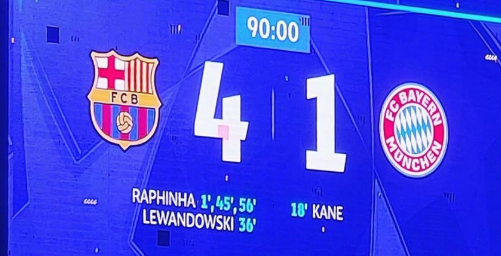
Legacy: A Wake-Up Call for Football’s Giants
The 8-2 defeat transcended Barcelona; it became a cautionary tale for elite clubs clinging to past glories. Bayern’s victory, by contrast, validated a model of sustainable success: nurturing youth (Alphonso Davies), strategic recruitment (Gnabry), and a clear tactical identity under Flick.
For Barcelona, the match remains a scar—but also a catalyst. By 2023, under manager Xavi Hernández, the club had begun to recover, winning La Liga in 2022–23 with a blend of young talent and experienced leaders. Yet the memory of that August night in Lisbon endures, a reminder that football’s greatest dynasties must evolve or perish.
As former Barcelona midfielder Xavi reflected: “That defeat was humiliating, but necessary. It forced us to look in the mirror and rebuild. You can’t live on history alone.” On August 15, 2020, football’s order was disrupted—not just by a scoreline, but by the unforgiving truth that even giants fall when they stop growing.




